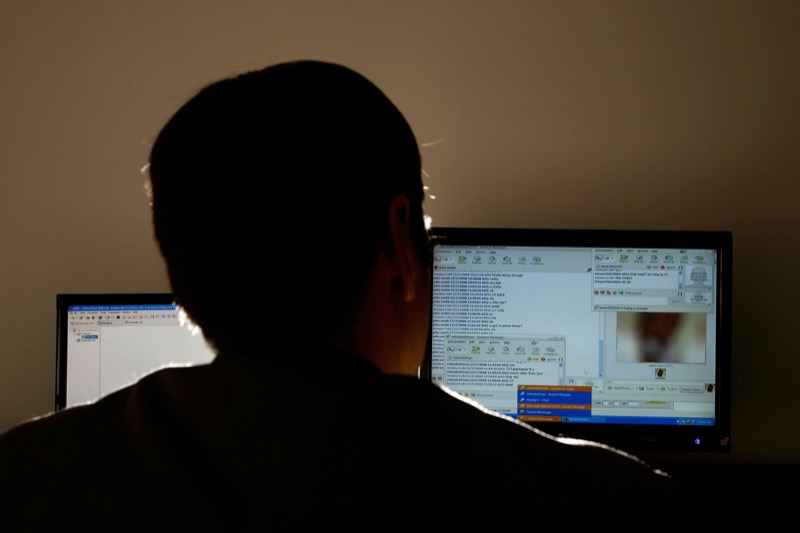On dates considered politically sensitive by the ruling Chinese Communist Party, police and local officials across China call up or visit anyone they think might cause some kind of trouble for the authorities, and take steps to silence or control them.
On “sensitive dates” such as June 4, the date of the 1989 Tiananmen killings, authorities target independent journalists, rights activists and lawyers, anyone with a grievance against the government, people who complain and petition the authorities, and anyone with a track record of posting online content that the government doesn’t like.
Meanwhile, an army of internet censors, many of whom work for private service providers, keeps a list of metaphors, code words, homophones and other workarounds to help them block and delete unwanted content.
They are putting into practice China’s “stability maintenance” system, designed to nip social unrest in the bud.

Blogger and former police detective Deng Haiyan, who uses the online handle “Second Uncle,” said the police are trying to get ahead of any potential unrest, and nip it in the bud.
“Every time there is a major celebration or festival, they want to make sure nothing untoward happens,” Deng said. “They assume that certain people will take the opportunity to cause trouble at a time like that.”
“Once trouble starts, it spreads very easily, so they want to lock it down beforehand.”
Former Sina Weibo censor Liu Lipeng said online service providers must keep a calendar of “sensitive dates” and be aware of certain keywords and workarounds that internet users may employ to evade censorship.
“As a service provider, you have to have a manual to avoid getting into trouble,” he said.
“Sensitive dates” include major political meetings like the National People’s Congress that ran in Beijing from March 5-11.
‘Picking quarrels and stirring up trouble’
Fu Yuxia, who is pursuing a complaint against the government through official petitioning channels, hails from a small town outside Lianyungang city in the eastern province of Jiangsu. She was detained by police in her hometown of Niushan in late February on charges of “picking quarrels and stirring up trouble.”
The reason? Fu had bought a rail ticket to visit her parents in Xuzhou, an action that was flagged by the stability maintenance system ahead of the Beijing parliamentary sessions.
“They’re afraid that I’ll go to Beijing during the National People’s Congress, so they have detained me in a rescue facility, with people from my local police station on guard outside, round the clock,” Fu told RFA Mandarin from detention.
“They keep coming to check that I’m still in my room,” she said, adding that police had also questioned her and taken her fingerprints, warning that she would be jailed if she made plans to travel to Beijing.


Calls to the Niushan police department rang unanswered during office hours one day ahead of the National People’s Congress’ opening session.
Hangzhou-based freelance writer Zan Aizong also had his liberty restricted during the parliamentary sessions by police in his home city of Hangzhou, who kept coming to his apartment to check up on him.
He complained in an online statement: “What do the parliamentary sessions have to do with me? I’m not a delegate to the National People’s Congress or the Chinese People’s Political Consultative Conference.”
Zan couldn’t see why he was being targeted, as he isn’t someone who is pursuing a grievance, nor a member of a persecuted group.
“I’m just a writer and a not-very-famous online commentator,” he said.
“Is it necessary to waste so much manpower and material resources? Is it necessary to maintain stability in this way?” Zan wanted to know.
Placed under guard
Meanwhile, state security police in Beijing were placing a guard outside the home of independent political journalist Gao Yu, according to her social media account.
“How are Beijingers supposed to live a normal life?” Gao said in a Feb. 27 post to her X account, calling the surveillance “unbearable.”
Gao said national security police repeatedly called her phone and turned up at her home in a bid to prevent her from meeting a dissident who was believed to be in Beijing.
Similar protocols are typically put in place every five years ahead of the Communist Party’s national congress, dissidents and activists have told RFA.
Petitioners and dissidents have told RFA Mandarin that they are also placed under guard, detention or house arrest up to two weeks ahead of China’s National Day, when the ruling Chinese Communist Party marks the founding of the People’s Republic of China by late supreme leader Mao Zedong on Oct. 1, 1949.


Qing Ming, the tomb-sweeping festival, can also be a political minefield for the authorities, because people often use it to commemorate high-profile dissidents like Liu Xiaobo and ousted former leaders like Zhao Ziyang.
Every April 5, police across the country are out in force to stop people from visiting the former homes and graves of people regarded as politically “sensitive” by the government.
In 2021, Geng He, wife of disappeared rights lawyer Gao Zhisheng, vowed to make offerings every year outside the Chinese Consulate in San Francisco on Qing Ming, because she can only assume her husband has died.
“I don’t have any dreams now. I only hope that the Chinese Communist Party (CCP) can return Gao Zhisheng’s ashes to me for humanitarian reasons.”
“I now have a premonition that is getting stronger and stronger, which is that Gao Zhisheng has been persecuted to death,” she said in a public statement. “Otherwise, he would definitely have found a way to contact us.”
“From this day onwards, I will treat the Chinese Communist Party’s consulate, the closest one to my home, as his cemetery.”
Sensitive international dates
Internationally recognized dates are also a cause for concern in Beijing.
In 2015, the detention of five Chinese women’s rights activists ahead of International Women’s Day sparked an international outcry.
Zheng Churan, Li Tingting, Wu Rongrong, Wei Tingting and Wang Man were rounded up by police on March 6, 2015, two days ahead of International Women’s Day, as they planned a campaign against sexual harassment on public transportation. They were accused of “picking quarrels and stirring up trouble.”
While they were eventually released “on bail” in April 2016, they remained criminal suspects under tight police surveillance and under the threat of prosecution, while at least one of them was prevented from leaving the country.
According to Liu Liping, International Women’s Day is another “sensitive date” in the Chinese government’s calendar, when censors clamp down on online content even more than usual.
“They’re afraid that [talking about] women’s rights will cause trouble on March 8,” Liu said. “They’re also worried that workers could cause trouble on International Labor Day [on May 1].”
He said China’s internet censors will often scout around on the internet outside the Great Firewall of Chinese censorship to find current keywords that they need to ban ahead of important dates.


Then there are the dates that resonate with anyone familiar with China’s recent history, like June 4, anniversary of the 1989 Tiananmen massacre.
All of those phrases have long been on censors’ list of “sensitive words,” and posts that contain them are highly unlikely to appear on any Chinese social media platform.
There is also a carefully disguised effort on the ground to ensure the majority of China’s 1.4 billion people go about their business as if the date was nothing special.
Each year, police make arrangements for the relatives of those killed by the People’s Liberation Army in 1989 to make offerings at their loved one’s grave sites.
The ceremonies are private, and low key, made under the watchful eye of the police minders assigned to members of the Tiananmen Mothers victims’ group, which has campaigned unsuccessfully for more than three decades for a public account of the deaths, the pursuit of official accountability for the killings, and compensation for victims’ families.
Enforced ‘vacations’
Beijing-based rights activist Hu Jia said in a recent recording of a conversation with friends that he is typically taken on an enforced “vacation” every year by state security police ahead of the date.
Police also targeted late massacre victim Qi Zhiyong, who was left disabled after the massacre, and fellow dissidents who might otherwise try to lay floral tributes for the victims in Tiananmen Square.
But Hu said the “stability maintenance” operation isn’t as intensive as during major political meetings like the National People’s Congress.
According to Deng Haiyan, that’s because the authorities want to erase people’s memories of the massacre, so avoid any public show of force on that date.
“They will target a specific group on that day with strict and comprehensive blockades and controls, but make sure that the public are totally unaware of it, so they can’t see or how big the iceberg really is,” Deng said.
Even decades-old dates can touch a nerve with the authorities.
Egg Fried Rice day is a colloquial term referring to the anniversary of the death of Mao Zedong’s son Mao Anying in a U.S. bombing raid during the Korean War (1950-1953).
According to an apocryphal story that still circulates widely in China, Mao Anying’s location was only discovered by the U.S. military because he broke blackout rules with a cooking fire, because he wanted to make fried rice.
In 2021, authorities in the eastern Chinese province of Jiangxi jailed a man surnamed Zuo for 10 days after he posted an irreverent comment on the Sina Weibo social media platform under the username @yuediyouyou.
“That fried rice was the best thing to come out of the whole Korean War,” the user wrote on Oct. 8, 2021, in a joking reference to the Nov. 25, 1950 death of late supreme leader Mao’s son Mao Anying in North Korea.


Internet chef Wang Gang caused a public storm last November after he made a video showing people how to make egg fried rice near the anniversary.
China has laws banning insults to revolutionary heroes and martyrs, as well as to the national anthem, its soldiers and police force.
Xi Jinping’s birthday has also become a sensitized date in recent years, according to Liu Lipeng.
“When it comes to June 15th, there are a bunch of references that won’t get posted, even the fat tiger in the Japanese comic Doraemon whose birthday is the same day as his,” Liu said. “On that day, it’s a sensitive word.”
“They have used the hero laws to arrest people on a large scale in recent years, just to create an atmosphere of terror,” he said. “No one dares to say no to his ultra-nationalist narrative. And this is the atmosphere they want.”
Translated by Luisetta Mudie.





















Discussion about this post